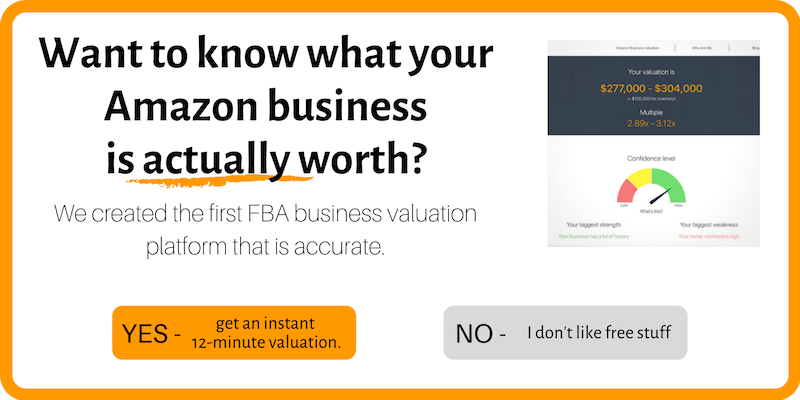
If you’ve given selling your FBA business any thought, you probably know that most of the value of an online business comes from how much money it makes.
For the most part, this is correct, but there are also many other things that directly influence the value of an Amazon business, some of which are surprisingly quick and easy to take advantage of.
We’ll cover 4 of the easiest and quickest of those here. Those are the very tips that have helped a number of people I know increase the value of their businesses virtually overnight and often by several tens to hundreds of thousands of dollars.
Switch your accounting from cash-based to accrual
I’ve already covered the difference between cash-based and accrual accounting in another article, but I won’t ever stop repeating the importance of this little and seemingly trivial thing.
Assuming all of the source documentation is there, it will take a good accountant anywhere from a few hours to a few days to flip your books from cash to accrual, but this tiny change can increase your business’s valuation a lot.
Take a look at my full write-up on accrual accounting for an example of how a client of mine had the valuation of his business increase by $300,000 just because of this one technicality!
Prepare Proper Documentation
Many brokers and other industry professionals claim that valuation and sellability are two separate things and topics like due diligence and available documentation belong in the latter category, not affecting the valuation as such. Others disagree and claim that every business is sellable, as long as it’s priced correctly.
Regardless of which of the two camps you choose to listen to, one thing is for sure – successfully selling your business requires it to sell in the first place, as well as to attract a fair price. And this means that regardless of how good your business is, your due diligence documentation also needs to be in order or your fairly-priced business may end up either not selling or not selling for the price you were hoping for.
To make matters worse, there’s a sub-segment of buyers out there who systematically go under LOI, only to put a ton of effort into finding holes in the due diligence phase and use these holes to (often successfully) re-negotiate the price on the 11th hour when all your other buyer leads have already gone cold and you’ve grown increasingly anxious to get the process wrapped up.
Because of all this, it pays to make sure your papers are in order. And it’s no rocket science, especially with an Amazon business. All you need, in most cases, is:
- A business bank account that has income and expenses relating to only the business you’re going to sell. If your accounts are co-mingled with other businesses or personal things, fix it. This is a huge issue in many deals.
- Proper accounting setup. For most Amazon sellers, this means hiring an accountancy firm to do all of this for you. Most accountants use either QuickBooks and Xero, which are both equally good in terms of the availability of data and reports.
- Have your business tax returns handy. With more and more online business acquisitions financed using SBA loans, the existence and accuracy of tax returns has become hugely important.
And that’s pretty much all there is to it. Everything else can be easily checked by logging in to your Seller Central account and exchanging an email or two with your vendors.
Have SOPs in Place
SOPs or Standard Operating Procedures are, in essence, a “User Manual” for your business – a set of step-by-step instructions for someone to run your business.
Odds are that for you, running your business seems quite easy and straightforward, but think of it this way:
If you were to put yourself in the shoes of the person buying your business and removed yourself from the equation then would you still be able to run the business with the same ease? Probably not.
Some sellers say that they’ll stick around after the sale so it won’t matter. In reality, it still does matter, as buyers don’t see it this way. For the buyer, you disappearing for whatever reason is always a risk they have to take into account, regardless of what you’re promising prior to the sale. And as with any risk, it often translates directly into the valuation amount.
Pro Tip: Most of the time, SOPs are combined into a very long Word document or a combination of few. But you can greatly save time and make the SOPs more readable by using (often free) software made specifically for that. Zapier has put together a list of software tools to use for SOPs, which I think is pretty good. Check it out!
Prepare a Detailed Growth Plan
I’ll need to start this with a caution.
While important, potential for growth (or how well you sell such potential) does not have a direct effect on the value of a business.
But it’s important to note the word “direct” here.
The fact that potential as such doesn’t have a direct impact doesn’t mean that it’s not important. Quite the contrary – it’s, in fact, very important.
Confused yet? No need. Let’s look at it this way. We have Business A doing $200k a year in EBITDA and showing no obvious growth potential.
We have Business B doing the same $200k but it has paved the way for its future growth.
Then we have Business C that, again, does exactly the same numbers, but its owner has taken the time to spell out in great detail how exactly he would go about growing and expanding the business if he were to not sell it.
Those three businesses are all listed for sale at $600,000. And that’s not unusual.
But where the huge difference comes is what happens after the businesses have been listed for
You see, even though it’s in most cases not right to assign growth potential a lot of weight when valuing your business, this doesn’t mean that buyers don’t think about it. They always do.
And as a buyer, before putting in an offer, you’d almost always want to have a plan in place for growing the business. Even though businesses A, B and C are actually the exact same business, in case of Business B it’s simply so much easier for potential buyers to see the growth potential than it is in case of Business A. And with Business C, it’s even easier.
Sure, some buyers won’t need this and are happy to figure out their own growth plans. Others may even disregard all of your plans and suggestions. But many buyers do want to hear your ideas and
Needless to say, the more buyers your business appeals to, the more likely it is that you’ll end up selling at your full asking price or more. Bidding wars are never a bad thing if you’re the seller!




